Mahabharata’s tales as old as time told by new voices at the Perth Festival
A single theatrical show attempts to give voice to a sprawling ancient Hindu text about what it means to be human.
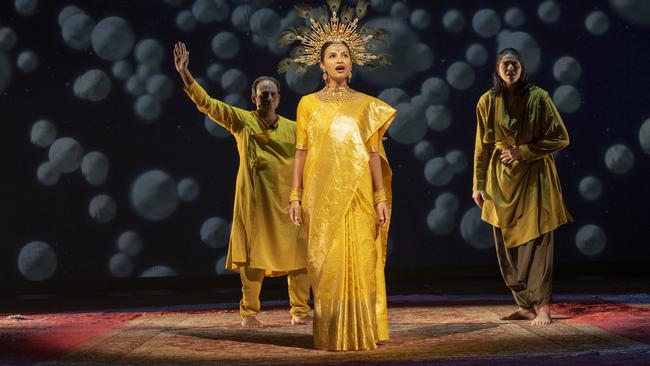
The Mahabharata is even greater than its 100,000 verses in the Sanskrit text.
At its most simple, it’s a story of warring families – Pandava and Kaurava royalty – and the ethics of ruling, war, violence and empathy, featuring the Bhagavad Gita (Song of God), a sacred text in Hindu spirituality.
Compiled between 400BC and 400AD, it’s been told with countless voices and variations, a dizzying array of characters and tales within tales, discussions between earthly and divine beings on core tenets of Hindu spirituality and fundamental concerns about what it means to be human.
How do you retell this sprawling, ancient epic within a single theatrical show, and give those voices new life in another tongue and another time?
An immense, nine-year undertaking by director Ravi Jain and associate director Miriam Fernandes of Toronto’s Why Not Theatre has brought us a fresh adaptation of the Mahabharata that first premiered at the Shaw Festival in 2023, and has since toured Toronto, Ottawa and London’s Barbican. As part of its 2025 tour, it will be performed at the Perth Festival in an Australian exclusive.
With a pared-back set and cast of 13 actors, an opera singer and six-person live band, Jain and Fernandes have led the most ambitious theatrical retelling of the saga since English director Peter Brook’s 1985 stage adaptation. Their performance is split into Part 1: Karma and Part 2: Dharma, with an optional communal storytelling meal between. Audiences can attend either Part 1 or 2, or everything in a single day.
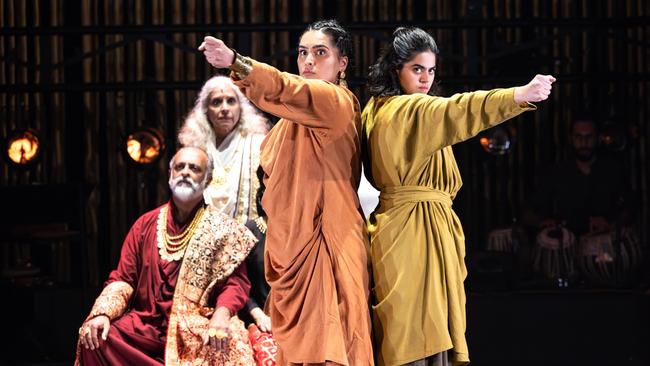
Jain and Fernandes say there is no “one way” to tell the Mahabharata. Theirs is through a lens of the Indian diaspora, both their own experiences and that of their collaborators – cast, dancers, musicians. While Jain grew up exposed to the epic in many forms, from the 1980s Indian TV series, called Mahabharat (“Every week, the Indian world would stop to watch it,” Jain recalls) to comic books or lessons taught by elders, Fernandes came to it later when studying the Bhagavad Gita in yoga and seeing Brook’s later, 1989, film version.
“You encounter it through life, and that was what we tried to do in the storytelling,” Jain says. “To find all the ways that it’s been told over thousands of years and pay homage to them. So much of how the story is told contains meaning.”
Their retelling uses a unique “hybrid” of East and West traditions, art and stylistic forms. “Hybrid” is a term they also apply to themselves and their cast, who are from the global Indian diaspora, showcasing multiple, evolving Indian identities.
“Some of them have trained in classical Indian dance like Odissi and Kathakali. We use those forms and pay homage to the ancientness of them, but because we’re hybrid contemporary artists we also break away or shift and bend the rules,” Jain says.
Part I begins with the ancient storytelling through which people experienced the Mahabharata: recited around the fireside. It evolves to include Indian traditional dance and shadow play, accompanied by a score featuring classical Indian music and Western elements. Part 2 shifts into contemporary forms. A 15-minute Baroque-style opera of the Bhagavad Gita in Sanskrit uses that form’s heightened emotional state to convey the conversation between the warrior Arjuna and the god Krishna, while digital projections and soundscapes create a “cosmic element” adding to the scale of the war.
“It amplifies that contemporary feeling,” Jain says. “To go from a foreign distant story to something that feels right here.”
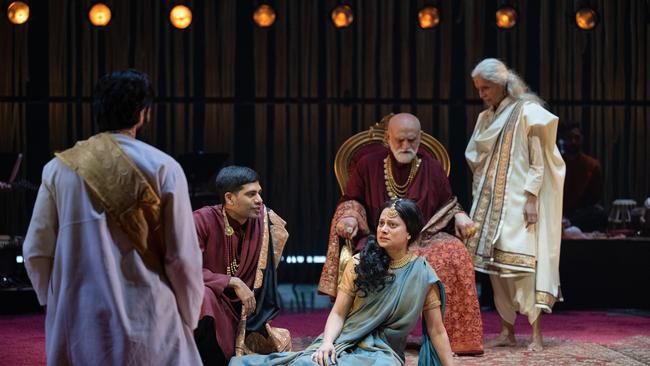
Complementary music, dance and visual arts open cross-cultural understanding, while the communal meal, Khana & Kahani, led by storyteller Sharada K. Eswar, offers audiences one of the most enduring ways of sharing the Mahabharata: via a “food and family experience”.
“You’re not bound solely by the experience of the words,” Jain says. “You can get into the feeling … and still come out understanding it.”
Writing the script was a massive undertaking, drawing from modern retellings such as the Mahabharata by Carole Satyamurti and Jaya by Devdutt Pattanaik.
“It was very unruly,” Jain says. “We kept trying to throw in more stories and then take them away and try to understand how to wrestle this thing into a shape that an audience can digest. There’s no such thing as the Mahabharata. It’s as long or as short as the storyteller makes it and focuses on whoever’s side the storyteller takes.”
Fernandes says choosing their perspective was critical to whittling down the vast text, with invaluable input from Indian dramaturg Rustom Bharucha on earlier versions of the script. “He says, you’re telling the story but what are you trying to say?” Fernandes says. “What’s your perspective on it? And that set us free from feeling like we didn’t have a right to tell the story.”
Massive global events during the show’s long development brought into focus timely topics.
“Me Too, the pandemic, Black Lives Matter, the climate emergency that continues with LA and the world,” Jain says. “Those are the things that resonated with us … The journey was to find a way to let the story communicate those themes … how can we get the audience to ask those questions of themselves in a way that isn’t pedantic or didactic?”
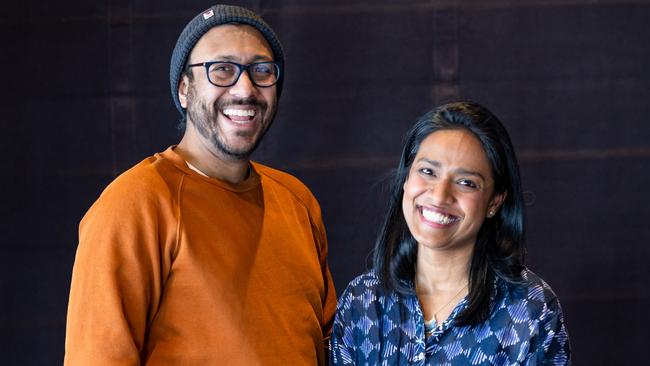
Storytelling, ecocide and dharma emerged as their three themes. “Storytelling, because [the Mahabharata] is told over thousands of years in many different forms and we’re still trying to get to the heart of it,” Fernandes says. “‘Ecocide’ asks ‘what’s our relationship to the planet, to the natural world around us?’
“And dharma. Ask any Indian what dharma means, everybody will say a different word because it’s so difficult to encapsulate … but the way we’ve defined dharma is as the law that governs human beings, which is the opposite of the law of the jungle … We have to have empathy. We can’t live in a world where the strong dominate the weak. It’s our responsibility to take care of those who have less power.”
With a shared background in improvisational theatre, they took a collaborative approach to workshopping the show with performers, tapping into that ancient improvised performance of the Mahabharata.
“The show was made by the people in the room,” Jain says. “It showcases them … it would be a very different show with a different group of people.”
The play is cast gender-blind, with actors taking on multiple roles.
“We’ve never been limited by the identities people have, because we’re in a world of imagination,” Jain says. “What’s so exciting about the work we’ve made is that it reveals so much more about characters, because they’re not bound by the limitations of those identities and people find a different kind of humanity that’s exciting and inspiring.”
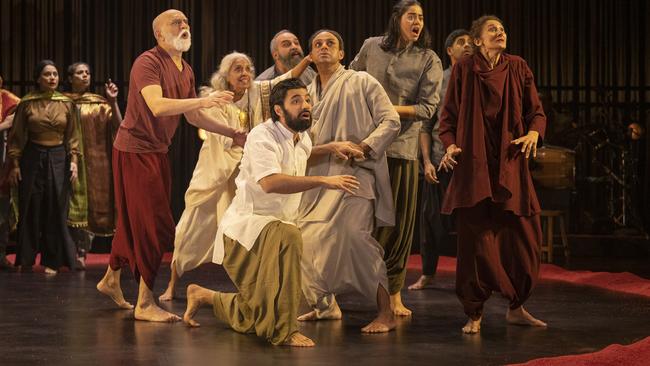
Their Mahabharata has attracted mixed audiences, from South Asian Indians who grew up with strong connections to these stories, to people with almost no prior knowledge, the “hybrid” diaspora falling somewhere between and even by multigenerational family groups attending together. Fernandes says this created opportunities for connection not just across generations, but culture – especially in the full-day viewing. One friend, she relates, gained deeper understanding of the Mahabharata through unexpected discussions with strangers all through the intermissions and communal meal.
“It’s very rare that you get to spend this much time together in a theatre,” Fernandes says. “The clash of cultures in the audience was really awesome and I think created a meaningful experience for both the South Asians and the non-South Asians who are encountering each other. The joy of experiencing this story for the first time or sharing this story with somebody who has never heard it was something I didn’t anticipate. But it was so beautiful to hear.”
“Sharing culture brings people together,” Jain says. “It’s why we travel. It’s why we’re curious about one another and that’s such a great example of what we’ve tried to do.”
Mahabharata premieres tonight at the Perth Festival (February 7-March 2), His Majesty’s Theatre, Hay Street, Perth. [Mahabharata runs February 8-16]

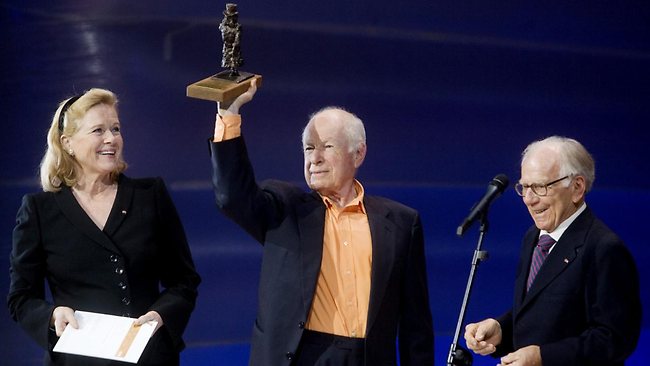




To join the conversation, please log in. Don't have an account? Register
Join the conversation, you are commenting as Logout